#the devil and daniel webster
Explore tagged Tumblr posts
Text
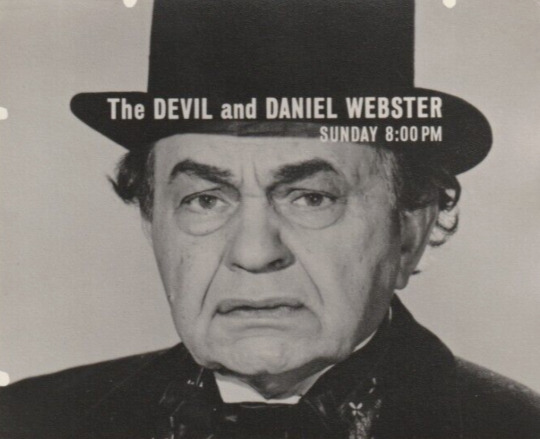
26 notes
·
View notes
Text
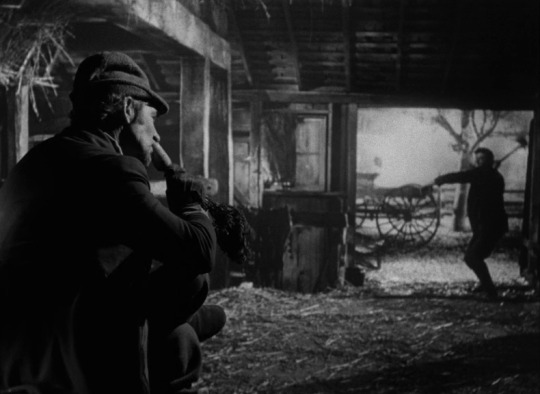
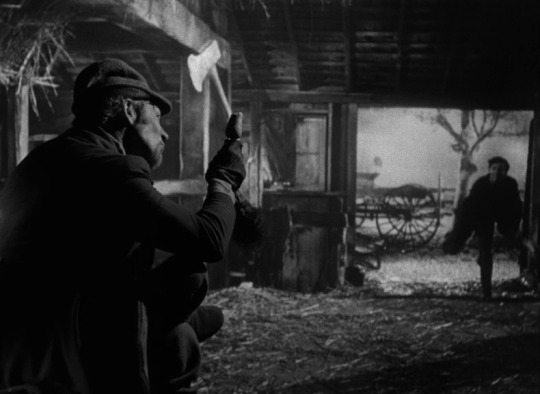
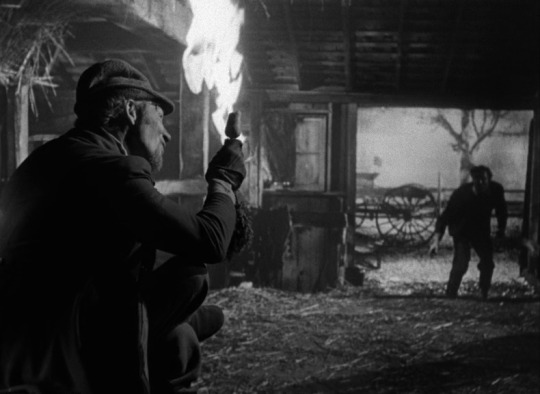
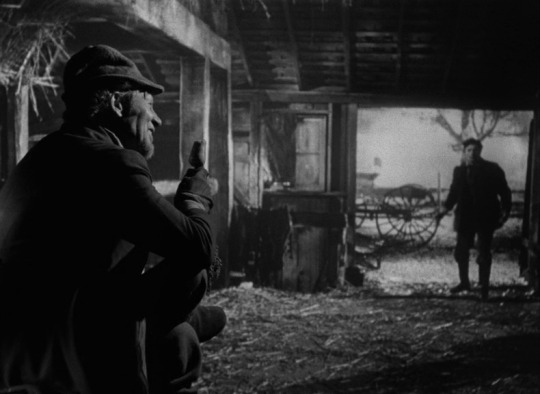
William Dieterle - All That Money Can Buy (1941)
22 notes
·
View notes
Text

A CrossOver between The Cuphead Show and The Devil and Daniel Webster
#antebellum#daniel webster#19th century rpf#american history#the cuphead show#the devil and Daniel Webster#doodle
6 notes
·
View notes
Text

The Devil and Daniel Webster, 1973
4 notes
·
View notes
Text
Now watching:
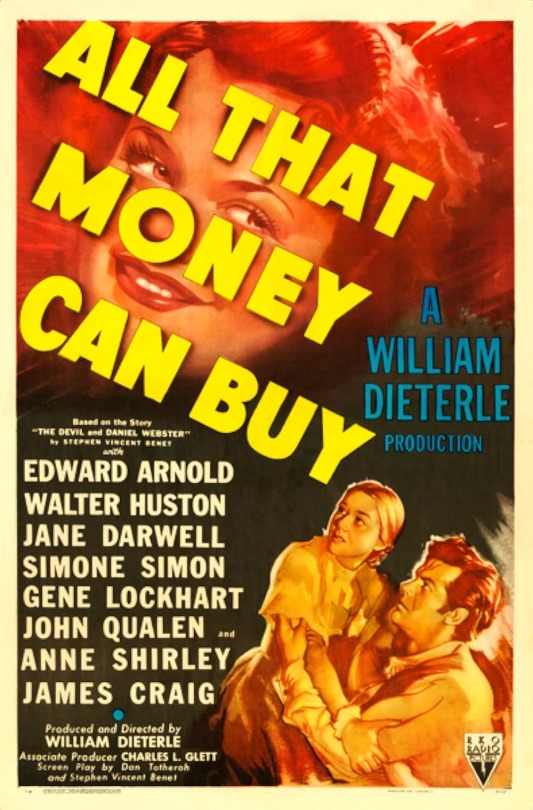
#all that money can buy#the devil and daniel webster#edward arnold#walter huston#simone simon#jane darwell#james craig
2 notes
·
View notes
Photo

The Devil and Daniel Webster
directed by William Dieterle, 1941
#The Devil and Daniel Webster#All That Money Can Buy#Mr. Scratch#Daniel and the Devil#William Dieterle#movie mosaics#James Craig#Walter Huston#Edward Arnold#H.B. Warner#Anne Shirley#Jane Darwell#Simone Simon
6 notes
·
View notes
Text

"All That Money Can Buy" is an American film based on the short story 'The Devil and Daniel Webster' by the American poet and writer Stephen Vincent Benét (July 22, 1898 – March 13, 1943). He is best known for his poem 'John Brown's Body' (1928).
#all that money can buy#the devil and daniel webster#poet#writer#stephen vincent benet#john brown's body
0 notes
Text
The Devil and Daniel Webster, a movie from 1941 about New Englanders defeating Satan with the power of patriotism.
It mostly hinges on the fact that the Devil is pretty stupid and randomly decides to submit to US Common Law.
But this is the same guy who lost that fiddle contest to some redneck who wasn't even that good, so I don't know. Maybe he's just tired.
youtube
(I doubt this is a legal upload but it's been 4 years so I guess Google is just tired, too.)
0 notes
Text

#The Devil and Daniel Webster#All That Money Can Buy#Edward Arnold#Walter Huston#Jane Darwell#Simone Simon#Gene Lockhart#John Qualen#James Craig#Anne Shirley#William Dieterle#1941
1 note
·
View note
Text
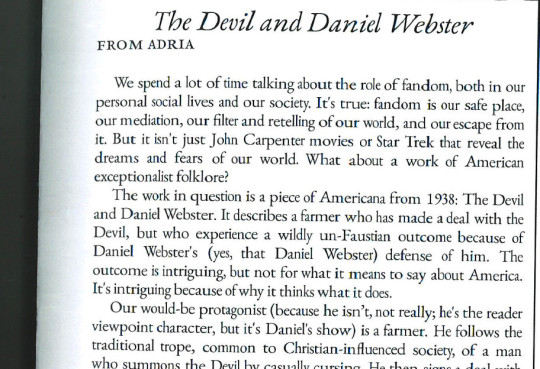
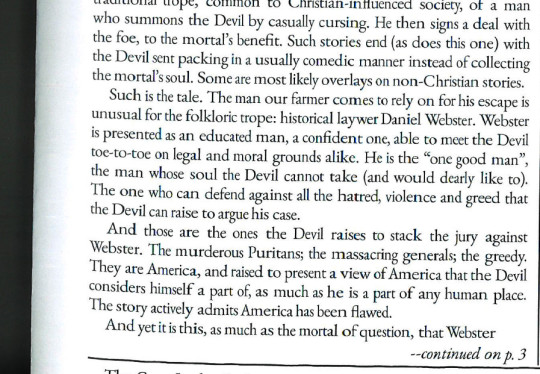
The Devil and Daniel Webster
1/2
From Adria
We spend a lot of time talking about the role of fandom, both in our personal social lives and our society. It's true: fandom is our safe place, our mediation, our filter and retelling of our world, and our escape from it. But it isn't just John Carpenter movies or Star Trek that reveal the dreams and fears of our world. What about a work of American exceptionalist folklore?
The work in question is a piece of Americana from 1938: The Devil and Daniel Webster. It describes a farmer who has made a deal with the Devil, but who experience a wildly un-Faustian outcome because of Daniel Webster's (yes, that Daniel Webster) defense of him. The outcome is intriguing, but not for what it means to say about America. It's intriguing because of why it thinks what it does. Our would-be protagonist (because he isn’t, not really; he's the reader viewpoint character, but it's Daniel's show) is a farmer. He follows the traditional trope, common to Christian-influenced society, of a man who summons the Devil by casually cursing. He then signs a deal with the foe, to the mortal’s benefit. Such stories end (as does this one) with the Devil sent packing in a usually comedic manner instead of collecting the mortal’s soul. Some are most likely overlays on non-Christian stories. Such is the tale. The man our farmer comes to rely on for his escape is unusual for the folkloric trope: historical laywer Daniel Webster. Webster is presented as an educated man, a confident one, able to meet the Devil toe-to-toe on legal and moral grounds alike. He is the “one good man”, the man whose soul the Devil cannot take (and would dearly like to). The one who can defend against all the hatred, violence and greed that the Devil can raise to argue his case. And those are the ones the Devil raises to stack the jury against Webster. The murderous Puritans; the massacring generals; the greedy. They are America, and raised to present a view of America that the Devil considers himself a part of, as much as he is a part of any human place. The story actively admits America has been flawed. And yet it is this, as much as the mortal of question, that Webster defends. What is a good American man, he argues, if not someone trying to better their pocketbook through all means necessary? (And he does defend a man; women are not included in this statement. America, as presented in this story, is not for us. One might assume the same of Black people. Slavery is mentioned, but it isn't given a representative amongst the Devil's allies. Neither does anyone opposing women's rights. Perhaps those aren't sufficiently of the Devil.)
Part 2
0 notes
Text
Short Story Review: The Devil and Daniel Webster/Stephen Vincent Benet
link:
http://gutenberg.net.au/ebooks06/0602901h.html
The concept of a lawyer defending someone who sold his soul to the Devil, arguing with the Devil himself, is very cool, but I feel that the story disappointed me on the delivery. I kept on waiting for something to happen and was let down by the ending; and while I get the ending I can think of ways to make it stronger, especially since SVB knows how to use strong, descriptive language.
0 notes
Text
god i LOVE it when a local paper sues their local police department
it gives me the over-the-top fuck-yes-civic-justice-high that i can normally only get from rereading The Devil and Daniel Webster for the nine billionth time
#99% of the time i'm a cynical bitch#but that last 1% is reserved for FUCK YEAH BABEYYYY FUCK THOSE PUBLIC-RECORDS-ACT-VIOLATING BASTARDS#and. y'know. rereading The Devil and Daniel Webster for the nine billionth time
17 notes
·
View notes
Text
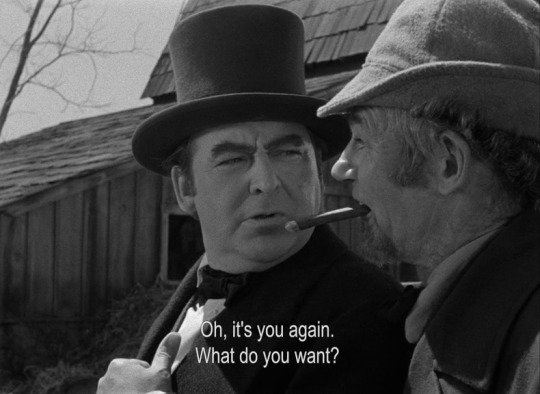
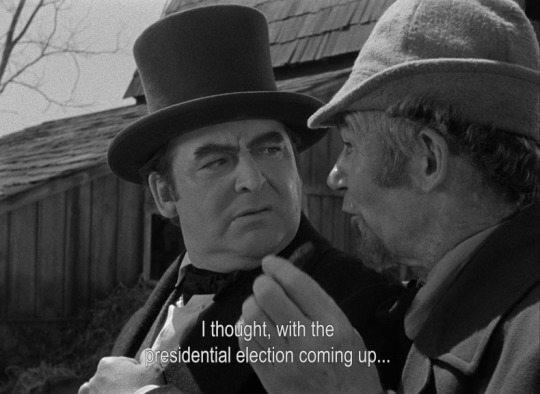
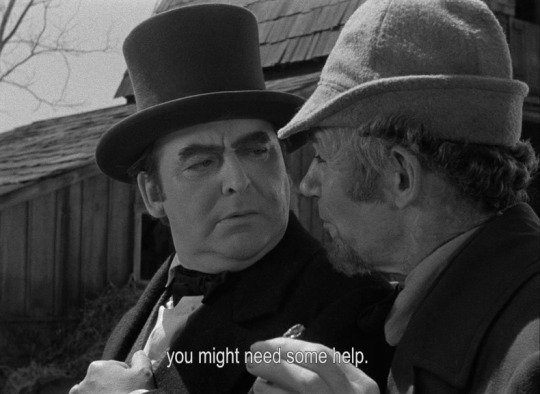
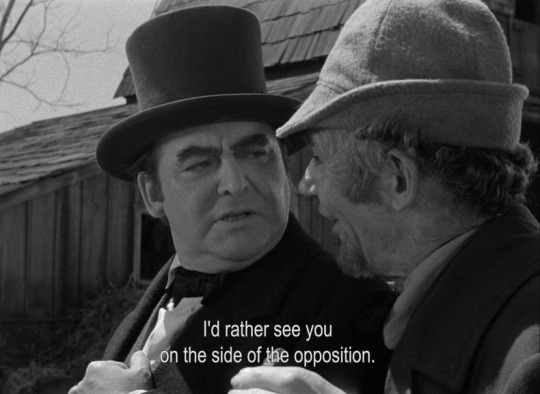
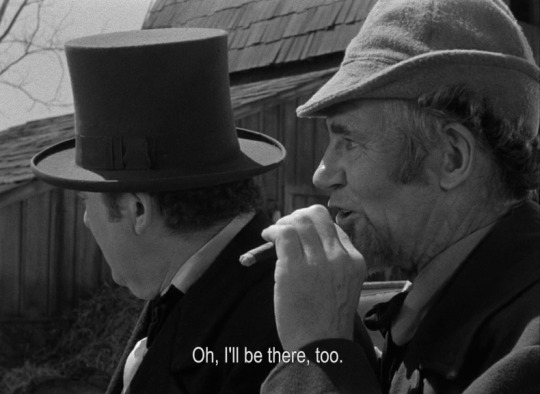
William Dieterle - All That Money Can Buy (1941)
#film#william dieterle#all that money can buy#the devil and daniel webster#edward arnold#walter huston#1941
5 notes
·
View notes
Text
the devil went down to georgia! triumvirate au
#the great triumvirite#daniel webster#henry clay#john c calhoun#henry clay is the fiddle player#but the way that either cal or dan could be the devil...
1 note
·
View note
Text
youtube
Trailer for the classic supernatural tale. Jabez Stone (James Craig) is a struggling farmer who sells his soul to the Devil (Walter Huston) for seven years of good luck. When the seven years runs out and Satan comes to collect, Stone is helped by the great Daniel Webster (Edward Arnold) to reclaim his soul by trying his case before a jury of famous condemned men like Benedict Arnold and Blackbeard!
1 note
·
View note
Text
References in Servamp
Arabian mythology
Jinn. Ch. 16
Greek mythology
Elpis. Ch. 75
Moirai. Ch. 108
Pandora. Ch. 130
Pygmalion. Ch. 123
Pandora's Box. Ch. 97
Japanese mythology
Gashadokuro. Ch. 129
Kitsune. Ch. 3
Raijin. Ch. 85
Norse mythology
Baldr. Ch. 39
Bifröst. Ch. 88
Brunhild. Ch. 88
Fimbulwinter. Ch. 40
Freya. Ch. 65
Frey. Ch. 131
Gleipnir. Ch. 101
Hati. Ch. 91, 131
Hod. Ch. 39
Hliðskjálf. Ch. 96
Idunn. Ch. 65
Loki. Ch. 15
Mimir. Ch. 29
Mjölnir. Ch. 53
Ragnarök. Ch. 101, 122, 131
Sigurd. Ch. 101
Thor. Ch. 41
Yggdrasil. Ch. 42
Biblical references
Abel. Ch. 8
Adam. Ch. 128
Boaz and Jachin. Ch. 42
Eden. Ch. 21
Eve. Ch. 1
John the Baptist. Ch. 122
Judith. Ch. 147
Lucifer. Ch. 135
Noah. Ch. 145
Nod. Ch. 29, events
Hinduism
Asura. Ch. 57.5, 89.
Tarot
The Fool - Mahiru. Ch. 50
I. The Magician – Night trio. Ch. 41
II. The High Priestess – Mikuni. Ch. 42
V. The Hierophant - Shuhei. Ch. 77
X. Wheel of Fortune - Junichiro. Ch. 53
XII. The Hanged Man - Tsurugi. Ch. 50
XV. The Devil – Shamrock. Ch. 72
XVI. The Tower - Touma. Ch. 47
XVII. The Star - Iduna. Ch. 73
XVIII. The Moon - Yumikage. Ch. 69
XX. Judgement - Mikuni. Ch. 144
Literary references
"Alice's Adventures in Wonderland" Lewis Carroll. Ch. 3, 4, 7, 19, 98, 122. Misono, Lily, Dodo, Mitsuki, Yamane, Hattori, Mikuni, Bad B and Good B.
"As You Like It" William Shakespeare. Ch. 10, 38.5. Mikuni's spell.
"My Fair Lady" English nursery rhyme. Ch. 10 Mikuni's spell.
"Dracula" Bram Stoker. Ch. 12, 30. Hugh.
"Romeo and Juliet" William Shakespeare. Ch. 23, 34. Hyde, Ophelia.
"Faust" by Johann Wolfgang von Goethe. Ch. 29 Johannes.
"Through the Looking-Glass" Lewis Carroll. Ch. 29, events. Mikuni, Johannes.
"Julius Caesar" William Shakespeare. Ch. 23, 84. Hyde.
"Strange Case of Dr. Jekyll and Mr. Hyde" Robert Stevenson. Ch. 23, 37. Hyde, Licht.
"Macbeth" William Shakespeare. Ch. 24, 31. Kuro, Saint Germain, Mahiru.
"Night on the Galactic Railroad" Kenji Miyazawa. Ch. 26, 142. Higan, Tsubaki.
"The Little Prince" Antoine de Saint-Exupéry. Ch 30, 67. Kuro, Mahiru, Sloth demon, Gear, probably Jeje.
"Hamlet" William Shakespeare. Ch. 33, 34. Hyde, Ophelia.
"The Phantom of the Opera" Gaston Leroux. Ch. 36 Licht and Hyde technique.
"Peter and Wendy" James Barry. Ch. 44, 56, 74. Tsurugi, Touma, Mahiru.
"Ring a Ring o' Roses" nursery rhyme. Ch. 53 Junichiro's spell.
“Peter Pan in Kensington Gardens” James Barry. Ch. 53, 75. Tsurugi, Touma.
"Death in Venice" Thomas Mann. Ch. 55 Gilbert technique.
"Total Eclipse" a play by Christopher Hampton. Ch. 55 Rayscent's technique.
"The Morning of the Last Farewell" Kenji Miyazawa. Ch. 57.5 Tsubaki.
"Spring and Asura" Kenji Miyazawa. Ch. 57.5 Tsubaki.
"The Catcher in the Rye" Jerome Salinger. Ch. 62 Shuhei.
"Four and Twenty Blackbirds" Agatha Christie. Ch. 62 Shuhei's spell.
"Metamorphosis" Franz Kafka. Ch. 62 Shamrock technique.
“The Nighhawk's Star” Kenji Miyazawa. Ch. 62, 76. Shamrock technique.
"Rock-a-bye Baby" an English lullaby. Ch. 70 Touma's spell.
“Schlafe, mein Prinzchen, schlaf ein” lullaby. Ch. 70 Touma's spell.
"Who Killed Cock Robin" an English nursery rhyme. Ch. 70 Yumikage's spell.
"The Wonderful Wizard of Oz" Lyman Frank Baum. Ch. 70, 88. Tsukimitsu brothers’ spells.
"Daddy-Long-Legs" Jean Webster. Ch. 74. Dark Night Trio, Touma.
"King Lear" William Shakespeare. Ch. 86. Hyde.
"The House of the Sleeping Beauties" Yasunari Kawabata. Ch. 86. Iori.
"The Divine Comedy" Dante Alighieri. Ch. 118, 120, 121. Niccolo, Ildio, Gluttony demon.
“A Brute's Love” (人でなしの恋) Edogawa Rampo. Ch. 122 Mikuni, Lily.
"Coppelia" ballet Leo Delibes. Chapter 122 Mikuni, Lily.
"Salome" Oscar Wilde. Ch. 122, 147. Mikuni, Lily.
"Turandot" opera by Giacomo Puccini based on the play by Carlo Gozzi. Ch. 129, 136. Lily.
"The Tempest" William Shakespeare. Ch. 131. Licht and Hyde.
"The Old Man and the Sea" Ernest Hemingway. Ch. 134 Hugh.
"Flowers for Algernon" Daniel Keyes. Ch. 135 Hugh.
"Jane Eyre" Charlotte Brontë. Ch. 136. Hokaze.
"Madama Butterfly" opera by Giacomo Puccini. Ch. 136. Lily.
"Hansel and Gretel" the Brothers Grimm. Ch. 140. Faust and Otogiri.
"Girl Hell" Yumeno Kyusaku. Ch. 147. Mikuni, Noah.
Music
"Für Elise" by Ludwig van Beethoven. Ch. 34
"Jesu, Joy of Man's Desiring" by Johann Sebastian Bach. Ch. 125
Sonata No. 17 "Tempest" by Ludwig van Beethoven. Ch. 131
Movies
"It's a Wonderful Life" (1946). Ch. 131
"Life is Beautiful" (1997). Ch. 131
I believe this list can be expanded. Somewhere I’ve written only chaps when some reference was mentioned for the first time and omitted all further mentions.
Special thanks to hello-vampire-kitty, joydoesathing and passmeabook, because some works wouldn’t be included in the list without their observations.
318 notes
·
View notes